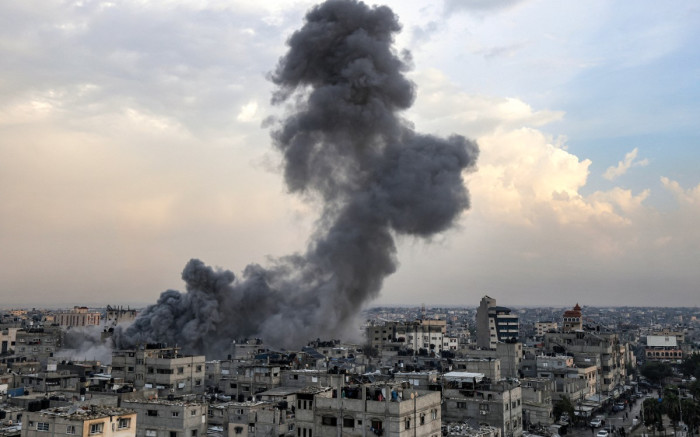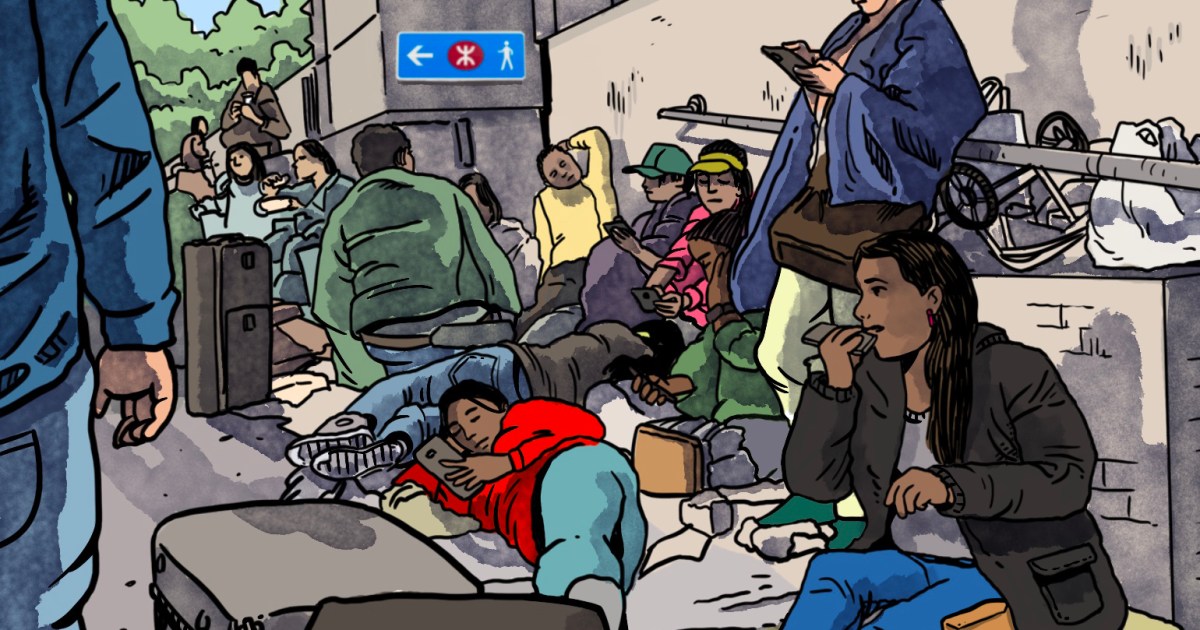
The Hamas-controlled Health Ministry said 18 people were killed in an attack on a house in Nuseirat refugee camp in the central Gaza Strip, while other targets were hit across the Gaza Strip.
A cloud of smoke erupts during the Israeli bombardment in Rafah in the southern Gaza Strip on December 12, 2023, amid ongoing fighting between Israel and the militant group Hamas. Image: AFP
JERUSALEM – Israel pressed ahead with its Gaza offensive on Saturday. Hamas authorities reported heavy shelling in several cities, hours after world powers demanded that more aid be allowed to enter the besieged Palestinian territory.
The Hamas-controlled Health Ministry said 18 people were killed in an attack on a house in Nuseirat refugee camp in the central Gaza Strip, while other targets were hit across the Gaza Strip.
The Israeli army said late Friday it had destroyed a “strategic” tunnel complex and a “Hamas headquarters and eliminated terrorists” during operations in Gaza City, where its forces were engaged in street battles with Hamas gunmen.
The health ministry in Gaza, ruled by the Islamist movement Hamas since 2007, said more than 400 people were killed in Israeli bombings in 48 hours.
The latest violence came after the UN Security Council passed a resolution calling for “immediate, safe and unhindered” shipments of life-saving aid to be brought to Gaza on a “large scale”.
The decision came after members argued over the wording for days.
At Washington’s urging, the Security Council weakened some provisions and avoided calling for a ceasefire that would end the 11-week war that began with Hamas’s bloody raids on Israel on October 7.
It is still unclear what impact, if any, the vote will have on site.
U.N. Secretary-General António Guterres said a ceasefire was still needed, arguing that aid could not be adequately delivered while the bombs were falling.
“The way Israel is conducting this offensive creates massive obstacles to the distribution of humanitarian aid,” he said.
There is a threat of famine
Immediately after the UN vote, Israel vowed to continue its air and ground assault on the Gaza Strip until Hamas was “eliminated” and the hostages still held in the area were released.
“Israel will continue the war in Gaza,” Foreign Minister Eli Cohen said, emphasizing that the war is legal and just.
But pressure is growing on the Israeli authorities to realign the Gaza offensive.
The war began on October 7 when Hamas gunmen broke through Gaza’s militarized border and killed about 1,140 people in Israel, mostly civilians, according to an AFP tally based on Israeli figures.
According to Israeli authorities, Palestinian militants also kidnapped about 250 people, 129 of whom still live in the Gaza Strip.
Promising to destroy Hamas, Israel launched a relentless bombardment and ground invasion of the Gaza Strip, killing 20,057 people, mostly women and children, according to the territory’s Hamas government.
With large swaths of the Gaza Strip reduced to rubble, many Gazans have been forced into overcrowded shelters or tents and are struggling to find food, fuel, water and medical care.
The United Nations estimates that the fighting has displaced nearly 80 percent of Gaza’s 2.4 million residents.
The head of the World Health Organization, Tedros Adhanom Ghebreyesus, warned that the majority of those forced from their homes would now have to go “entire days and nights without food.”
“There is hunger and there is a threat of famine,” he said.
“Massive obstacles”
Hopes for a Christmas ceasefire are fading with each passing day, although talks brokered by Qatar, Egypt and the United States are still ongoing.
As part of a week-long ceasefire that ended on December 1, 105 hostages were released from captivity in the Gaza Strip, including 80 Israelis, in exchange for 240 Palestinian prisoners.
“This is not life: no water, no food, nothing,” said wheelchair-bound Walaa al-Medini, now in the Bureij refugee camp in central Gaza after her home in Gaza City was attacked.
“My daughter died in my lap and I was rescued after three hours under the rubble,” she said. “Our house and everything around us was destroyed.”
The much-delayed UN resolution on Friday came about after days of diplomatic dispute and was only passed thanks to the abstentions of the USA and Russia.
This will give the United Nations a greater role in coordinating aid deliveries to Gaza.
However, Israel’s foreign minister insisted that his country will remain in control of what enters the Gaza Strip and will “continue to review all humanitarian aid to the Gaza Strip for security reasons.”
Hamas called the resolution “an inadequate measure that does not respond to the catastrophic situation created by the Zionist (Israeli) war machine.”
According to the United Nations, the number of aid trucks entering the Gaza Strip is well below the daily prewar average.
conflagration
Last week, Israel approved the delivery of aid through the Kerem Shalom border crossing with Gaza, and according to the army, an average of 80 trucks enter the Palestinian territory through this crossing every day.
During a media tour of the facility organized by the Israeli military on Friday, journalists could see a mile-long line of aid trucks waiting for hours to be inspected by soldiers.
Egyptian driver Said Abdel Hamid appeared unfazed by the wait and said he was “proud to bring help to my Palestinian brothers” as he removed the tarpaulin covering his load of flour for inspection.
Since the conflict began, the West Bank, the Israel-Lebanese border, Iraq, Syria and the sea off Yemen have become flashpoints – and Iranian-backed groups regularly warn about their ability to expand the war well beyond Gaza.
Israel said one of its soldiers was killed Friday by rocket fire from Lebanon, where Iran-backed Hezbollah and other groups have carried out almost daily cross-border attacks in support of Hamas.
Hezbollah said Israeli fire killed two of its fighters.
Missiles from Yemen’s Iran-backed Houthi rebels, who claim to be acting in solidarity with Gazans, have disrupted shipping in the Red Sea.
The US accused Iran of being involved in the attacks.
“We know that Iran was instrumental in planning operations against merchant vessels in the Red Sea,” said Adrienne Watson, spokeswoman for the National Security Council.






Recent Comments